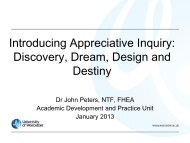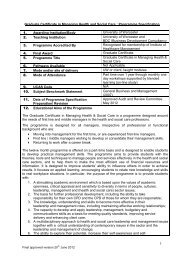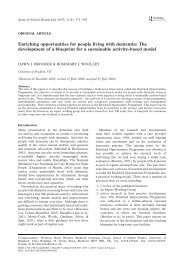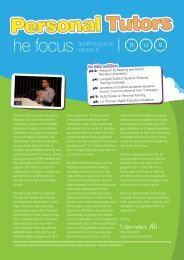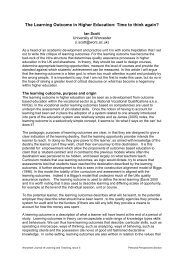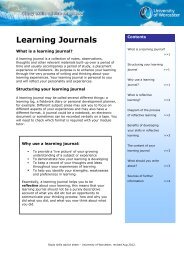Mentoring and Coaching stories - University of Worcester
Mentoring and Coaching stories - University of Worcester
Mentoring and Coaching stories - University of Worcester
You also want an ePaper? Increase the reach of your titles
YUMPU automatically turns print PDFs into web optimized ePapers that Google loves.
Carrying out a small-scale research project into the nature <strong>of</strong> informal coaching <strong>and</strong> mentoringpractices, led me to value <strong>and</strong> respect the importance <strong>of</strong> these practices for trainees, as well asan underst<strong>and</strong>ing <strong>of</strong> the high level <strong>of</strong> skill required by tutors on daily basis.As a result <strong>of</strong> undertaking the <strong>Mentoring</strong> <strong>and</strong> <strong>Coaching</strong> module I identified key points which Iwished to inform future practice. I felt it was important to agree an outcome for the meeting witha mentee at the beginning <strong>of</strong> the tutorial to provide a focus for discussion, <strong>and</strong> I haveimplemented this strategy, although I have found that by asking questions regarding thepurpose for setting up a tutorial prior to actually meeting it allows me to prepare better for afocused discussion.From my view as the tutor on this course it has been interesting <strong>and</strong> very rewarding to work withcolleagues. There has been a deep engagement with the issues around mentoring <strong>and</strong>coaching <strong>and</strong> ongoing research <strong>and</strong> development in this area. The participants have operated atthe ‘forefront <strong>of</strong> pr<strong>of</strong>essional practice’ <strong>and</strong> there has been a strong relationship between theory<strong>and</strong> practice.Three key themes have emerged from the assignments <strong>and</strong> student reflections. These helpclarify important elements that have arisen from the course <strong>and</strong> from the student’s research.The first concerns role conception - there is a need to continually reflect on the relationshipbetween the mentor <strong>and</strong> coach <strong>and</strong> the mentee, coachee. Discussion <strong>of</strong> the terminologysurrounding mentoring <strong>and</strong> coaching is more than semantics, it provides a necessary <strong>and</strong>illuminating critique <strong>of</strong> the activities. It helps move beyond an adherence to one position oranother, to recognition <strong>of</strong> the complex, dynamic inter-relationships involved in one personhelping another. Clutterbuck uses the term developmental space which is helpful for both thementor <strong>and</strong> mentee (2004). Key words used in all assignments were; partnership, collaboration,uniqueness, trust, empowerment, respect, friendship, enabling <strong>and</strong> relationship. The effectivementor works to establish <strong>and</strong> develop all <strong>of</strong> these.Clutterbuck <strong>and</strong> Wynne (1994) suggest mentor, coach, counselor, networker <strong>and</strong> facilitator in asimilar mode as role descriptors. There is a growing recognition that the mentor can undertakeall <strong>of</strong> these roles. Thomas (2004) refers to this as a triangle <strong>of</strong> support involving coaching,mentoring <strong>and</strong> counseling, all needed at different times.The second theme is that <strong>of</strong> communication. Underst<strong>and</strong>ing the ‘mental model’ <strong>of</strong> the mentee bythe mentor is an important first step in supporting learning (Senge, 1999) The key skills <strong>of</strong>building rapport, listening <strong>and</strong> questioning <strong>and</strong> moving on, as well as providing feedback,emerge as areas for ongoing research (Creasy&Patterson, 2005). The skills are used to enablethe mentee to gain awareness <strong>and</strong> underst<strong>and</strong>ing <strong>and</strong> importantly, as Whitmore suggests(2002) take responsibility.Finally all participants in the mentoring <strong>and</strong> coaching activity can be empowered throughsuccessful helping relationships. This leads to an increase in self confidence <strong>and</strong> self – efficacy.It encourages high levels <strong>of</strong> intent <strong>and</strong> a belief in the ‘capacity to achieve a desired outcome’(B<strong>and</strong>ura, 1998) The assignments demonstrate that mentoring <strong>and</strong> coaching developsemotional intelligence, personal growth <strong>and</strong> critical thinking. Saying the right thing at the righttime as well as asking difficult questions <strong>and</strong> providing challenge is a potent combination.The contributors to this paper have gone on to develop <strong>and</strong> deepen their expertise as a mentors<strong>and</strong> coaches. A number <strong>of</strong> the group continued with their study to a Post Graduate Certificate in<strong>Mentoring</strong> <strong>and</strong> <strong>Coaching</strong> <strong>and</strong> some have focused on this area in the dissertation work.<strong>Worcester</strong> Journal <strong>of</strong> Learning <strong>and</strong> Teaching, Issue 6Articles Section



